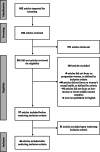A scoping review on women's sexual health in the postpartum period: opportunities for research and practice within low-and middle-income countries
- PMID: 35527298
- PMCID: PMC9079206
- DOI: 10.1186/s12978-022-01399-6
A scoping review on women's sexual health in the postpartum period: opportunities for research and practice within low-and middle-income countries
Abstract
Background: Women's sexual health is generally defined and explored solely in relation to reproductive capacity, and often omits elements of sexual function and/or dysfunction. Concerted focus is given to women's health during pregnancy; however, women's sexual health is largely neglected after childbirth. This scoping review explored how the sexual health of postpartum women has been defined, measured, and researched in low- and middle-income countries (LMICs).
Methods: Articles eligible for review were those that investigated women's sexual health during the first 12 months postpartum and were conducted among women aged 15-49 in LMICs. Eligibility was further restricted to studies that were published within the last 20 years (2001-2021). The initial PubMed search identified 812 articles, but upon further eligibility review, 97 remained. At this time, the decision was made to focus this review only on articles addressing sexual function and/or dysfunction, which yielded 46 articles. Key article characteristics were described and analyzed by outcome.
Results: Of the final included articles, five studies focused on positive sexual health, 13 on negative sexual health, and the remaining 28 on both positive and negative sexual health or without specified directionality. The most common outcome examined was resumption of sex after childbirth. Most studies occurred within sub-Saharan Africa (n = 27), with geographic spread throughout the Middle East (n = 10), Asia (n = 5), North Africa (n = 3), and cross-geography (n = 1); notably, all five studies on positive sexual health were conducted in Iran. Negative sexual health outcomes included vaginismus, dyspareunia, episiotomy, perineal tears, prolapse, infection, obstetric fistula, female genital cutting, postnatal pain, uterine prolapse, coercion to resume sex, sexual violence, and loss of sexual desire/arousal. Most studies were quantitative, though eight qualitative studies elucidated the difficulties women endured in receiving information specific to sexual health and hesitance in seeking help for sexual morbidities in the postpartum period.
Conclusions: Overall, the evidence base surrounding women's sexual health in the postpartum period within LMICs remains limited, with most studies focusing solely on the timing of resumption of sex. Integration of sexual health counseling into postnatal care and nonjudgmental service provision can help women navigate these bodily changes and ultimately improve their sexual health.
Keywords: Postpartum; Sexual dysfunction; Sexual function; Sexual health.
© 2022. The Author(s).
Conflict of interest statement
The authors declare they have no competing interests.
Figures
References
-
- World Health Organization (WHO) Definining Sexual Health. Geneva: WHO; 2005.
Publication types
MeSH terms
LinkOut - more resources
Full Text Sources
Medical


